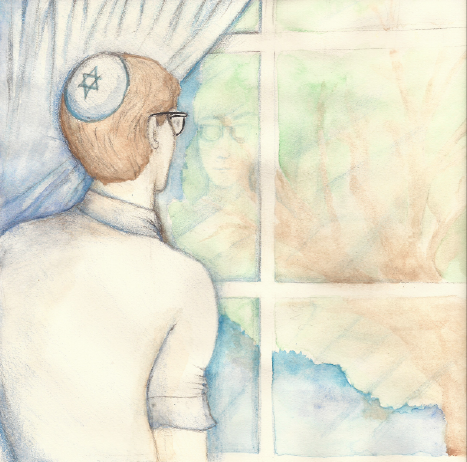Illustration by Allison Hernandez
_________________
In recent years, widespread public campaigns and vocal issue advocacy have helped mental health organizations better apprise the public on the ins and outs of mental illness. But while these organizations have made inroads in clarifying what constitutes mental illness, there remains frequent misunderstanding in popular American culture about it and those who suffer from it.
Sadly, the Jewish tradition and its scripture — both commonly available English translations and perhaps the Hebrew words themselves — fall victim to these misconceptions (and even fundamental misunderstandings), as well. Of course, much of the misunderstanding in Jewish scripture is rooted in its antiquity, existing more because of the lack of available knowledge of the time than because of any problems with the specific Jewish understanding.
But still, these misunderstandings stemming from antiquity become a problem when they are not contemporarily regarded as obsolete. Many Jews view the Torah and its derivative halachah as the be-all and end-all of our lives, as eternal truth, and as the fundamental source of meaning and order of the cosmos. Thus, no matter how apparent the inaccuracy of a halachic claim, there certainly may be some whose strong (perhaps blind) faith inhibits them from seeing past the limitations of the scripture.
In the case of mental illness, this phenomenon may pose a barrier to the greater Jewish community in its ability to assimilate today’s greater knowledge about mental health into its own traditional definition. For example, in discussing Judaism’s traditional understanding of mental health, contemporary rabbis frequently cite the Talmud’s Hagigah 3b, which designates a mentally ill man as an “imbecile” and defines him as someone who “goes out alone at night” or “tears his garments.”
According to the U.S. Department of Health and Human Services, this type of understanding plays into one of the most problematic myths about mental illness: that “people with mental health problems are [often] violent or unpredictable.” In fact, most people suffering from mental health problems “are highly active and productive members of our communities,” making it unlikely for others to even identify them as mentally ill.
Furthermore, in discussing the definition of mental illness for legal purposes, Maimonides seems to confuse or conflate all types of mental illness with intellectual disability, referring to people who are “too stupid to note contradictions” and people who “behave in an excessively crazy fashion” by the same term. Of course, today, scientific knowledge demonstrates that the myriad of mental health illness from which people suffer every day vary drastically, both in terms of the causes of the illness and the symptoms the illness triggers.
But perhaps the most problematic notion that still circulates in some Jewish communities is whether Torah observance can be prescribed as a remedy to all problems. Implicit in this understanding is that mental health problems, like major depression, mean little more than a temporary mood of sadness or transient barrier to happiness. Like everything else, major depression is nothing that can’t be solved by faithful acceptance of the Torah and adoption of the accompanying lifestyle. In propounding these kinds of claims, these people arrogate to themselves the title of psychiatrist or counselor, claiming to know how to treat mental illness when in fact they have no such qualifications.
Luckily, this opinion does not seem to pervade the vast majority of the religious Jewish community, especially in places where it matters most. According to the previously linked page from the U.S. Department of Health and Human Services, at least one in ten teens suffers from major depression at some point in his or her adolescence or young adulthood. It is refreshing to know that there are spiritual and religious leaders like Rabbi Jacob Rupp, rabbi at JAM at UCLA, who seem to understand the gravity of mental illness and the ways in which it should be treated.
Ha’Am reached out to Rabbi Rupp, who said that Judaism can in fact make people feel happy by engaging in the intellectual, dialectical debate involved in Torah study. However, he specifically and explicitly noted that this kind of engagement cannot necessarily help cure someone of actually suffering from mental illness.
Of course, research about how best to cure mental illness has elicited little definitive proof as to the best means available. According to the U.S. Department of Health and Human Services, “treatment for mental health problems varies depending on the individual and could include medication, therapy, or both. Many individuals work with a support system during the healing and recovery process.” On a related note, studies have shown that some who suffer from mental illness are challenged by chemical imbalances in their brains, while others have more typical chemical compositions in their brains. Of these two groups, some from each group respond better to therapy and activities-based treatment, while others from each group respond better to medication-based treatment.
Evidently, there is still much confusion and uncertainty surrounding the topic of mental illness, yet there are also places where some in the Jewish community could improve in their approaches to it and play a part in helping the more than 80 percent of children who do not get the help they need. Often, those suffering from mental illness are reluctant to express the difficulties they are enduring or are incapable of doing so for a host of reasons, one of which is the stigma surrounding mental health in our society.
As Jews, it behooves us to ensure we understand the plights of the mentally ill in the community; it behooves us to give voice to the voiceless and advocate on their behalf; it behooves us to uplift the downtrodden through our understanding, through our open hearts and through our eager ears; and it behooves us to adapt and grow so that we can cater to, support and empower all of those living in our community.

